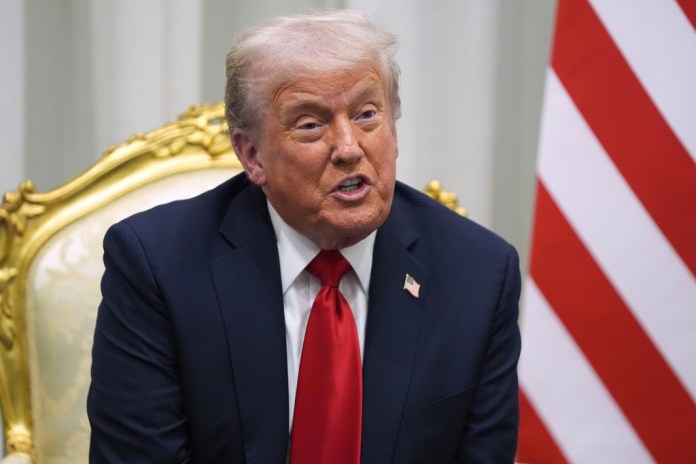Trump announces mass clemency for all Jan. 6 defendants – Washington Examiner
On January 20, 2025, President Donald Trump announced a sweeping clemency initiative from the Oval Office, granting pardons adn commutations to nearly 1,600 individuals charged in connection with the January 6 Capitol riot. This decision represents one of the most extensive clemency measures in U.S. history and is seen as a stark challenge to the Justice Department’s extensive examination into the events that transpired on that day.
Trump characterized the defendants as having been treated unfairly,with “brutal” judges and prosecutors.He argued that many of them, particularly nonviolent offenders, had already served critically important time in jail. The clemency extended to individuals who had committed various offenses during the riot, including assaults on law enforcement officers and damage to property. Specifically,14 individuals received commutations,reducing thier sentences to time served,while full pardons were granted to most others.
Among those pardoned was Enrique Tarrio, the former chairman of the Proud Boys, who had been sentenced to 22 years for his role in the events of January 6. Trump’s clemency declaration was seen as fulfilling his campaign promise to help those he referred to as “hostages” of the judicial system, a phrase that drew criticism from some political opponents.
The move has generated significant backlash, especially from the families of victims of the riot, including the family of Capitol Police Officer Brian Sicknick, who died shortly after the events. Critics argue that the clemency undermines the severity of the crimes committed and dismisses the experiences of law enforcement and victims involved in the Capitol attack. The pardons could also have implications for ongoing criminal proceedings and the broader discussions about the Capitol riot’s legacy in U.S. politics.
Trump announces mass clemency for all Jan. 6 defendants
President Donald Trump announced from the Oval Office on Monday that he was granting pardons and commutations to the nearly 1,600 defendants charged over the Jan. 6 Capitol riot, marking one of the most expansive clemency announcements in history.
Trump’s pardons and commutations for the defendants, a stunning repudiation of the Justice Department’s wide-ranging four-year investigation into the Capitol attack, extended to nonviolent rioters, including those who damaged and stole property, and those who engaged in violence.
INAUGURATION DAY LIVE UPDATES: DONALD TRUMP RETURNS TO THE WHITE HOUSE
“They’ve been treated very unfair,” Trump said. “The judges have been absolutely brutal. The prosecutors have been brutal.”
Trump’s announcement came as part of a heavy show of executive force on day one of his presidency, taking action to bring the popular Chinese-owned platform TikTok temporarily back online, rein in illegal border crossings, withdraw from the World Health Organization, and more.
Trump said the violent Jan. 6 defendants, many of whom attacked police officers after they stormed restricted areas of the Capitol in protest of the 2020 election results, had “been in jail for a long time already.”
“These people have been destroyed,” Trump said.
At least 1,583 people faced charges over the Capitol attack and the DOJ secured guilty pleas or convictions for at least 1,230 of them, according to federal data. Roughly 200 pleaded guilty to felonies that included assaulting officers, while more than 220 others were convicted in trials of offenses that included attacks on law enforcement.
Trump granted commutations to 14 defendants, reducing their sentences to time served through Inauguration Day, and he gave full pardons to everyone else. Trump said that the Bureau of Prisons was “immediately” beginning to process all of the some 200 defendants still in prisons across the country out of jail.
Former Proud Boys Chairman Enrique Tarrio exits prison
Enrique Tarrio, a former leader of the far-right Proud Boys who received a 22-year sentence for his outsize role in organizing the riot, was granted a full pardon, according to Trump’s announcement.
His lawyer Nayib Hassan told the Washington Examiner he received word that Tarrio was being processed out of a Louisiana prison as of Monday night.
A Senate report found that during the Capitol attack, some officers suffered brain injuries, cracked ribs, and chemical burns. One officer lost an eye, while another was stabbed. Dozens of other defendants faced charges of stealing or destroying government property.
Ten defendants were convicted of rare seditious conspiracy charges. They were mostly members of the Proud Boys and Oath Keeps and were all serving out yearslong prison sentences before Trump’s clemency. Some of them were part of the small group who received commutations instead of pardons.
Attack on Brian Sicknick
U.S. Capitol Police Officer Brian Sicknick, whom a rioter sprayed with a chemical irritant, suffered multiple strokes in the aftermath of the incident and died the day after it. Washington’s chief medical examiner said Sicknick died of natural causes but also told the Washington Post the riot had a role in his death. Sicknick’s brother joined more than 100,000 people in signing a petition opposing the pardons ahead of Trump’s announcement on Monday.
“My brother was just 42 years old. Nothing will erase the events from that day or bring Brian back. But pardoning the insurrectionists is a blow to every single person who cares about fairness, justice, and freedom,” Craig Sicknick said in a statement.
Sicknick’s attacker, Julian Khater, received a full pardon. Khater had been sentenced to more than six years in prison after he admitted to breaching restricted areas of the Capitol and spraying at least two officers, including Sicknick, in the face with bear spray, injuring them and rendering them unable to perform their job duties.
Trump’s vow to Jan. 6 ‘hostages’
Trump’s announcement meant he made good on his repeated promise during his campaign to carry out a large-scale clemency operation at the start of his presidency for the defendants, whom he frequently described as “hostages.”
Democrats and some Republicans have criticized Trump’s use of that word, calling it offensive. Former Vice President Mike Pence said last year it was “unacceptable” to describe “people that are moving through our justice system” as hostages.
Defense attorneys and the defendants themselves had been anxiously awaiting Trump’s announcements, as the president remained vague about his plans through Inauguration Day, only saying he would grant clemency to a “large portion” of the defendants. His spokeswoman had maintained that the pardons would be granted on a “case-by-case” basis.
Numerous defendants still in the court process had asked judges in recent weeks to pause their proceedings, citing their expectation that they would be recipients of Trump’s pardons. Meanwhile, others had been urging Trump to grant pardons to all defendants, arguing the DOJ’s entire four-year prosecution of them was tainted by politics.
Critics of the prosecutions have said the DOJ deviated from its norms for the Jan. 6 cases by prosecuting even minor infractions in an atypically aggressive manner. They also have lamented that the resource-intensive operation was hoarding valuable judicial manpower and money that could have been directed toward addressing other violence in the nation’s capital.
Police officers
Rioters beat Metropolitan Police Department Officer Daniel Hodges’s head against a door, causing him to bleed and suffer a concussion. Hodges has been outspoken in defense of officers since the attack and received a surprise preemptive pardon from President Joe Biden on Monday. Biden said he was worried Hodges and a handful of other vocal officers would become a target of retribution. Hodges conveyed disappointment on X after hearing the news of Trump’s pardons.
“Just worked about 14 hours making sure Trump’s inauguration was secure and peaceful, got home, read this [pardon news]. Thanks America,” Hodges wrote.
Hodges’ attackers were pardoned, as were others who beat police officers.
Jake Lang was charged for stealing a police riot shield and beating officers’ legs with a baseball bat, causing one officer a monthslong injury. Tom Webster, a former longtime New York Police Department officer, was serving out a 10-year sentence after he attempted to attack an officer with a metal pole, wrestled the officer to the ground, and grabbed the officer’s gas mask, and shoved it into his face. Robert Palmer was sentenced to more than five years in prison for throwing a heavy wooden plank at police officers and spraying them with a fire extinguisher, before also chucking the extinguisher at them.
INAUGURATION DAY LIVE UPDATES: DONALD TRUMP TO BE SWORN IN FOR SECOND TERM
Trump’s pardons will terminate all proceedings against defendants still in the court process and restore civil rights, such as the ability to vote, for those who lost them as a result of their convictions. Trump’s clemency is largely symbolic for the large swathe of people who faced misdemeanors and whose court proceedings are long over.
Former U.S. Attorney Matthew Graves of Washington, D.C., who led the prosecutions, addressed Trump’s anticipated pardons in a recent television interview, indicating he took solace in the fact that the pardons would not erase defendants’ records.
“A pardon does not wipe away what occurred,” Graves said. “There will always be a record of what occurred. There will always be vindication of rule of law, and there’s been substantial accountability for hundreds of people involved in illegal conduct that day.”
" Conservative News Daily does not always share or support the views and opinions expressed here; they are just those of the writer."




